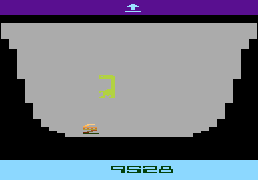Overview
Licensed games are video games that are based on an existing intellectual property licensed by the game's publisher. They have existed as early as 1976, when Sega released the arcade game Fonz, a rebranded version of the game Moto-Cross featuring the character Fonzie from the TV show Happy Days. Licensed games serve as appealing avenue for some publishers due to the name recognition that an existing intellectual property may carry, and they are in some ways easier to market than a new, untested IP. However, because of this easy name recognition, numerous licensed games have been released in substandard forms in order to cash in on the property in question. LJN, a publisher that was most active in the 1980s and was later bought by Acclaim Entertainment, based almost their entire catalog on licensed games ranging from horror films like Friday the 13th to superheroes such as the X-Men.
The Stereotype
 The Atari 2600's E.T.: The Extra-Terrestrial is widely considered one of the worst games ever made.
The Atari 2600's E.T.: The Extra-Terrestrial is widely considered one of the worst games ever made.The stereotype of the "crappy licensed game" probably stems most from the existence of games produced specifically as a tie-in with a new or upcoming theatrical film. Though there are exceptions to the rule, most notably with games such as GoldenEye 007 and Chronicles of Riddick, it is still the case that the majority of games based on new motion pictures tend to review poorly in professional critical outlets. A major contributing factor for this problem are the constraints that the license puts on the development team. In most cases, it is expected that a game created as a film tie-in will be released within weeks if not days of the film's theatrical debut. Thus, the game must be put into a shippable state well before the target release date of the film in order to pass certification and begin the duplication and shipping process. Between the time that the publisher acquires the movie license and the target release date, the development team may have to endure a truncated development cycle in which corners may need to be cut in order to meet the deadline. The owners of the property may also not have any particular mandate regarding a game's quality concerns so long as the game is released within a sufficient time frame to promote the film.
GoldenEye 007, one of the aforementioned games to have escaped this pattern and receive near universal praise upon release, escaped this trap partially because its release was delayed until long after the film it tied into had left theaters. The extended duration of its development allowed for the release of a better product overall.
Log in to comment